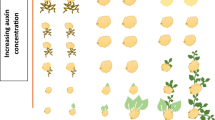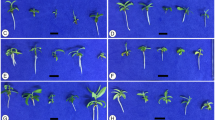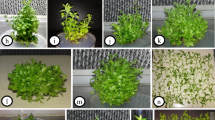Abstract
Biotechnology provides valuable tools to support conservation of plant species, especially in case of threatened taxa or when dealing with seed unavailability, low viability or sterility. However, plant cell culture methods have often to face problems associated with tissue recalcitrance to in vitro systems. Recalcitrance can be related to a variety of triggering factors, involving many efforts and manipulations within one or more of the micropropagation stages before obtaining successful results. An in vitro propagation protocol was developed for Zelkova sicula, a very rare and endangered relict tree, endemic to Sicily (Southern Italy). The species revealed extremely recalcitrant to in vitro culture approaches, but after many trials throughout a number of years an effective micropropagation protocol was completed. The rooting rate was about 84% of the treated explants, 8% of which were successfully acclimatized outdoor and reintroduced in the wild within a comprehensive conservation project. The technique allowed to overcome the problems of sexual sterility of this species, hence contributing concretely to contrast the problems connected with its conservation. However, additional efforts need to be carried out in order to refine the acclimatization step and further improve the whole process effectiveness.
Key Message
A micropropagation protocol was developed for the rare and endangered tree species Zelkova sicula. The in vitro procedure allowed to overcome seed sterility providing a plant stock successfully reintroduced in the wild.


Similar content being viewed by others
References
Alkemade R, van Oorschot M, Miles L, Nellemann C, Bakkenes M, ten Brink B (2009) GLOBIO3: a framework to investigate options for reducing global terrestrial biodiversity loss. Ecosystems 12:374–390. https://doi.org/10.1007/s10021-009-9229-5
Amoo SO, Finnie JF, Van Staden J (2011) The role of meta-topolins in alleviating micropropagation problems. Plant Growth Regul 63:197–206. https://doi.org/10.1007/s10725-010-9504-7
Aremu AO, Bairu MW, Doležal K, Finnie JF, Van Staden J (2012) Topolins: a panacea to plant tissue culture challenges? Plant Cell Tiss Org 108:1–16. https://doi.org/10.1007/s11240-011-0007-7
Babu KN, Sajina A, Minoo D, John CZ, Mini PM, Tushar KV, Rema J, Ravindran PN (2003) Micropropagation of camphor tree (Cinnamomum camphora). Plant Cell Tiss Org 74:179–183. https://doi.org/10.1023/A:1023988110064
Bayraktar M, Hayta S, Parlak S, Gurel A (2015) Micropropagation of centennial tertiary relict trees of Liquidambar orientalis Miller through meristematic nodules produced by cultures of primordial shoots. Trees-Struct Funct 29:999–1009. https://doi.org/10.1007/s00468-015-1179-2
Benson EE (2000) Special symposium: In vitro plant recalcitrance: an introduction. In vitro Cell Dev Biol 36: 141–148. https://doi.org/10.1007/s11627-000-0029-z
Bertsouklis KF, Papafotiou M (2009) In vitro propagation of Arbutus andrachne L. Acta Hort 813:477–480. https://doi.org/10.17660/ActaHortic.2009.813.63
Bouza L, Jacques M, Sotta B, Miginiac E (1994) Relations between auxin and cytokinin contents and in vitro rooting of tree Peony (Paeonia suffruticosa Andr.). Plant Growth Regul 15:69–73. https://doi.org/10.1007/BF00024678
Brooker R, Britton A, Gimona A, Lennon J, Littlewood N (2011) Literature review: species translocations as a tool for biodiversity conservation during climate change. Scott Nat Heritage Comm Rep 440:68 p. https://doi.org/10.1111/j.1523-1739.2009.01264.x
Bunn E, Turner SR, Dixon KW (2011) Biotechnology for saving rare and threatened flora in a biodiversity hotspot. In vitro Cell Dev Biol 47:188–200. https://doi.org/10.1007/s11627-011-9340-0
Campo G, Mazzeo G, Nucifora S, Perrotta G, Sidoti A, Bella S (2018) Insects and fungi on the relict Zelkova sicula (Rosales, Ulmaceae) in Sicily (Italy): new records and known species in a short review. Redia 101:23–30. https://doi.org/10.19263/REDIA-101.18.04
Carimi F, De Pasquale F (2003) Micropropagation of Citrus. In: Jain SM, Ishii K (eds) Micropropagation of woody trees and fruits. Kluwer, Dordrecht, pp 589–619. https://doi.org/10.1007/978-94-010-0125-0_20
Carra A, Del Signore MB, Sottile F, Ricci A, Carimi F (2012) Potential use of new diphenylurea derivatives in micropropagation of Capparis spinosa L. Plant Growth Regul 66:229–237. https://doi.org/10.1007/s10725-011-9645-3
Cassells AC, Carney BF, McCarthy E, McHugh A, Harmey MA (1988) Problems posed by cultivable bacterial endophytes in the establishment of axenic cultures of Pelargonium x domesticum: the use of Xanthomonas pelargonii-specific ELISA, DNA probes and culture indexing in the screening of antibiotic treated and untreated donor plants. Acta Hortic 225:153–162. https://doi.org/10.17660/ActaHortic.1988.225.16
Christe C, Kozlowski G, Frey D, Bétrisey S, Maharramova E, Garfì G, Pirintsos S, Naciri Y (2014) Footprints of past intensive diversification and structuring in the genus Zelkova (Ulmaceae) in South-western Eurasia. J Biogeogr 41:1081–1093. https://doi.org/10.1111/jbi.12276
De Klerk GJ, Van Der Krieken WM, de Jong JC (1999) The formation of adventitious roots: new concepts, new possibilities. In vitro Cell Dev Biol 35:189–199
Debnath SC (2005) Micropropagation of lingonberry: influence of genotype, explant orientation, and overcoming TDZ-induced inhibition of shoot elongation using zeatin. HortScience 40:185–188
Duhem K, Le Mercier N, Boxus PH (1988) Difficulties in the establishment of axenic in vitro cultures of field collected coffee and cacao germplasm. Acta Hortic 225:67–76. https://doi.org/10.17660/ActaHortic.1988.225.7
Gao YY, Wang YN, Jiang JH (1996) Tissue culture of Zelkova serrata. Q J Chin For 29:171–186
Garfì G (1997) Première contribution à l’étude de Zelkova sicula (Ulmaceae). In: une relique de la flore tertiaire, endémique de la Sicile sud-orientale (Systématique – Caryologie – Dynamique de la croissance – Dendroécologie). + annexes, Marseille, 235 Thèse Doct, Univ. D’
Garfì G, Buord S (2012) Relict species and the challenges for conservation: the emblematic case of Zelkova sicula Di Pasquale, Garfì et Quézel and the efforts to save it from extinction. Biodivers J 3:281–296
Garfì G, Carimi F, Pasta S, Rühl J, Trigila S (2011) Additional insights on the ecology of the relic tree Zelkova sicula Di Pasquale, Garfì et Quézel (Ulmaceae) after the finding of a new population. Flora 206:407–417. https://doi.org/10.1016/j.flora.2010.11.004
Garfì G, Pasta S, Fazan L, Kozlowski G (2017) Zelkova sicula. The IUCN Red List of Threatened Species 2017: e.T61678A86134112. http://dx.doi.org/10.2305/IUCN.UK.2017-3.RLTS.T61678A86134112.en. Accessed 19 Mar 2018
Giri CC, Shyamkumar B, Anjaneyulu C (2004) Progress in tissue culture, genetic transformation and applications of biotechnology to trees: an overview. Trees Struct Funct 18:115–135. https://doi.org/10.1007/s00468-003-0287-6
Granata G, Sidoti A, Tamburino V (2002) Funghi endofiti in arbusti di Zelkova sicula. In: Atti del Convegno nazionale “L’endofitismo di funghi e batteri patogeni in piante arboree ed arbustive”. Sassari-Tempio Pausania, 19–21 maggio 2002, pp. 303–311
Gratzfeld J, Kozlowski G, Fazan L, Buord S, Garfì G, Pasta S, Gotsiou P, Fournaraki C, Dimitriou D (2015) Whither rare relict trees in a climate of rapid change? Conservation challenges of Zelkova sicula and Z. abelicea: two Mediterranean narrow endemics. BGjournal 12:21–25
Grigoriadou K, Vasilakakis M, Eleftheriou EP (2002) In vitro propagation of the Greek olive cultivar ‘Chondrolia Chalkidikis’. Plant Cell Tiss Org Cult 71:47–54. https://doi.org/10.1023/A:1016578614454
Haddad B, Carra A, Saadi A, Haddad N, Mercati F, Gristina AS, Boukhalfa S, Djillali A, Carimi F (2018) In vitro propagation of the relict Laperinne’s olive (Olea europaea L. subsp. laperrinei). Plant Biosyst 152:621–630. https://doi.org/10.1080/11263504.2017.1306002
Hummer KE (1999) Biotechnology in plant germplasm acquisition. In: Benson D (Ed.), Benson E Plant conservation biotechnology. CRC, London, pp 25–39
Jin XL, Zhang RQ, Zhang DL, He P, Cao FX (2009) In vitro plant regeneration of Zelkova schneideriana, an endangered woody species in China, from leaf explants. J Hort Sci Biotechnol 84:415–420. https://doi.org/10.1080/14620316.2009.11512542
Kartsonas E, Papafotiou M (2007) Mother plant age and seasonal influence on in vitro propagation of Quercus euboica Pap., an endemic, rare and endangered oak species of Greece. Plant Cell Tiss Org Cult 90:111–116. https://doi.org/10.1007/s11240-007-9232-5
Keskitalo MK (1999) Exploring biodiversity to enhance bioactivity in the genus Tanacetum through protoplast fusion. Academic Dissertation, University of Finland, Department of Plant Production, Section of Crop Husbandry, Publication No. 53, p 113
Kevers C, Hausman JF, Faivre-Rampant O, Dommes J, Gaspar T (2009) What we have learned about the physiology of in vitro adventitious rooting of woody plants and how it relates to improvements in the practice. In: Niemi K (ed) Adventitious root formation of forest trees and horticultural plants: from genes to applications. Research Signpost, Kerala, pp 400–417
Kozlowski G, Frey D, Fazan L, Egli B, Bétrisey S, Gratzfeld J, Garfì G, Pirintsos S (2014) The Tertiary relict tree Zelkova abelicea (Ulmaceae): distribution, population structure and conservation status on Crete. Oryx 48:80–87. https://doi.org/10.1017/S0030605312001275
Krishnan PN, Decruse SW, Radha RK (2011) Conservation of medicinal plants of Western Ghats, India and its sustainable utilization through in vitro technology. In vitro Cell Dev Biol 47: 110–122. https://doi.org/10.1007/s11627-011-9344-9
Lambardi M, Rugini E (2003) Micropropagation of olive (Olea europaea L.). In: Jain SM, Ishii K (eds) Micropropagation of woody trees and fruits. Kluwer Academic Publishers, The Netherlands, pp 621–646. https://doi.org/10.1007/978-94-010-0125-0
Lloyd G, McCown B (1980) Commercially-feasible micropropagation of mountain laurel, Kalmia latifolia, by use of shoot-tip culture. Comb Proc Int Plant Propag Soc 30: 421–427
Mallón R, Rodríguez-Oubiña J, González ML (2010) In vitro propagation of the endangered plant Centaurea ultreiae: assessment of genetic stability by cytological studies, flow cytometry and RAPD analysis. Plant Cell Tiss Org Cult 101:31–39. https://doi.org/10.1007/s11240-009-9659-y
Marks TR, Simpson SE (1994) Factors affecting shoot development in apically dominant Acer cultivars in vitro. J Hort Sci 69:543–551. https://doi.org/10.1080/14620316.1994.11516486
Martínez MT, Corredoira E, Vieitez AM, Cernadas MJ, Montenegro R, Ballester A, Vieitez FJ, San José MC (2017) Micropropagation of mature Quercus ilex L. trees by axillary budding. Plant Cell Tiss Org Cult 131:499–512. https://doi.org/10.1007/s11240-017-1300-x
McCown BH (2000) Special symposium: In vitro plant recalcitrance. Recalcitrance of woody and herbaceous perennial plants: Dealing with genetic predeterminism. In vitro Cell Dev Biol 36: 149–154. https://doi.org/10.1007/s11627-000-0030-6
Nadel BL, Altman A, Pleban S, Hüttermann A (1991) In vitro development of mature Fagus sylvatica L. buds. I. The effect of medium and plant growth regulators on bud growth and protein profiles. J Plant Physiol 138:596–601. https://doi.org/10.1016/S0176-1617(11)80248-8
Onay A (2000) Micropropagation of pistachio from mature trees. Plant Cell Tiss Org Cult 60:159–163. https://doi.org/10.1023/A:1006423914951
Papagianni A, Papafotiou M, Bertsouklis KF (2017) In vitro propagation of Arbutus unedo var. rubra starting from seedlings and adult parental plants. Acta Hort 1189:469–472. https://doi.org/10.17660/ActaHortic.2017.1189.93
Reed BM, Sarasan V, Kane M, Bunn E, Pence VC (2011) Biodiversity conservation and conservation biotechnology tools. In vitro Cell Dev Biol 47: 1–4. https://doi.org/10.1007/s11627-010-9337-0
San José MC, Martínez MT, Cernadas MJ, Montenegro R, Mosteiro F, Corredoira E (2017) Biotechnological efforts for the propagation of Quercus lusitanica Lam., an endangered species. Trees Struct Funct 31:1571–1581. https://doi.org/10.1007/s00468-017-1570-2
Sarasan V, Cripps R, Ramsay MM, Atherton C, McMichen M, Prendergast G, Rowntree JK (2006) Conservation in vitro of threatened plants: progress in the past decade. In vitro Cell Dev Biol 42:206–214. https://doi.org/10.1079/IVP2006769
Schulz B, Boyle C (2005) The endophytic continuum. Mycol Res 109:661–686. https://doi.org/10.1017/S095375620500273X
Tao R, Sugiura A (1992) Micropropagation of Japanese persimmon (Diospyros kaki L.). High-tech and micropropagation II. In: Bajaj YPS (ed) Biotechnology in Agriculture and Forestry, vol 18. Springer, Berlin, pp 424–440. https://doi.org/10.1007/978-3-642-76422-6_22
Vengadesan G, Ganapathi A, Anand RP, Selvaraj N (2003) In vitro propagation of Acacia sinuata (Lour.) Merr. from nodal segments of a 10-year-old tree. In vitro Cell Dev Biol 39:409–414. https://doi.org/10.1079/IVP2003421
Vieitez AM, San-Jose MC, Sánchez MC, Ballester A (2003) Micropropagation of Fagus spp. In: Jain SM, Ishii K (eds) Micropropagation of Woody Trees and Fruits. Kluwer Academic Publishers, Dordrecht, pp 181–215. https://doi.org/10.1007/978-94-010-0125-0
Ziv M (1986) In vitro hardening and acclimatization of tissue culture plants. In: Withers LA, Alderson PG (eds) Plant tissue culture and its agricultural application. Butterworth, London, pp 187–196
Acknowledgements
The results of this work are part of the activities funded by the Programme LIFE+, Project LIFE10 NAT/IT/000237 Zelkov@zione (http://www.zelkovazione.eu/). The authors are also grateful to the Fondation Franklinia for its valuable support.
Author information
Authors and Affiliations
Contributions
AC, GG, LF and GK conceived the paper. LA, AC, CC, OB, FLB and AM designed and performed the in vitro experiments. AC, FC and GG supervised all the experiments. AC, CC, FC, SP and GG wrote the manuscript. All authors contributed to the discussions and approved the final manuscript.
Corresponding author
Ethics declarations
Conflict of interest
The authors declare that they have no conflict of interest.
Additional information
Communicated by Sergio J. Ochatt.
Publisher’s Note
Springer Nature remains neutral with regard to jurisdictional claims in published maps and institutional affiliations.
Rights and permissions
About this article
Cite this article
Carra, A., Catalano, C., Badalamenti, O. et al. Overcoming sexual sterility in conservation of endangered species: the prominent role of biotechnology in the multiplication of Zelkova sicula (Ulmaceae), a relict tree at the brink of extinction. Plant Cell Tiss Organ Cult 137, 139–148 (2019). https://doi.org/10.1007/s11240-019-01558-x
Received:
Accepted:
Published:
Issue Date:
DOI: https://doi.org/10.1007/s11240-019-01558-x




